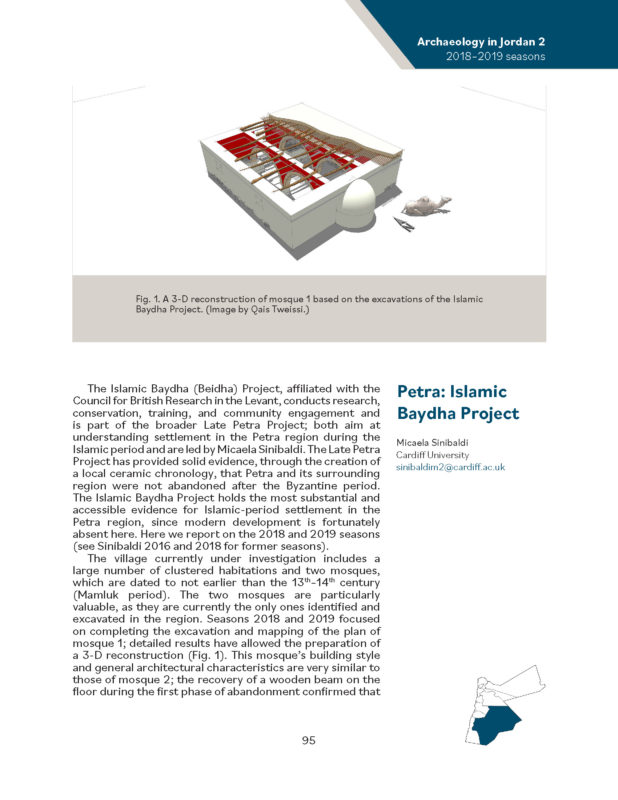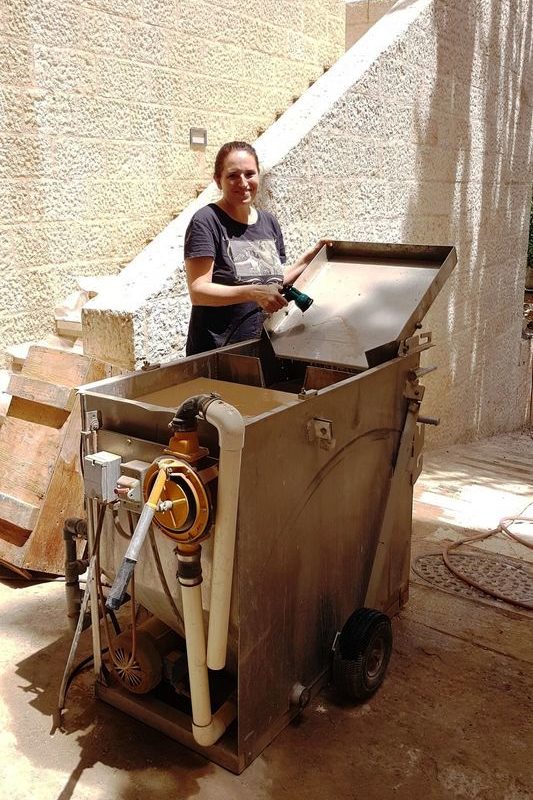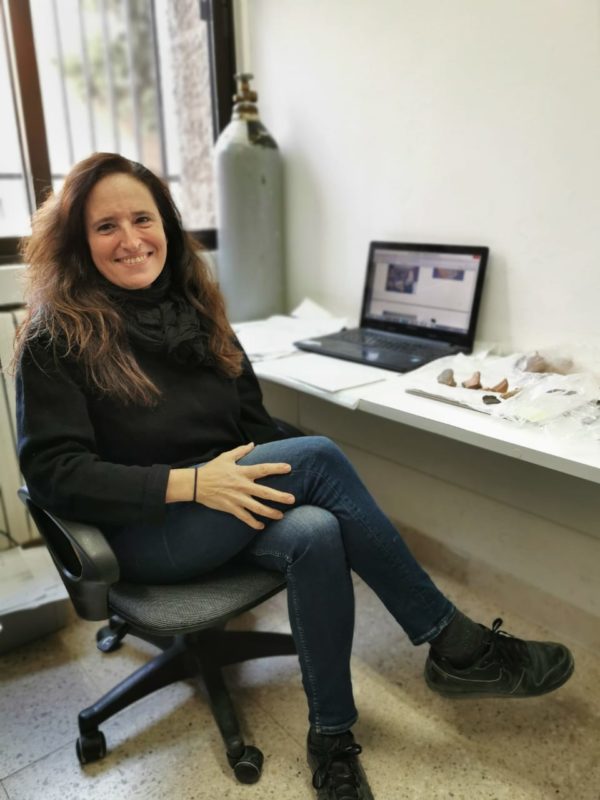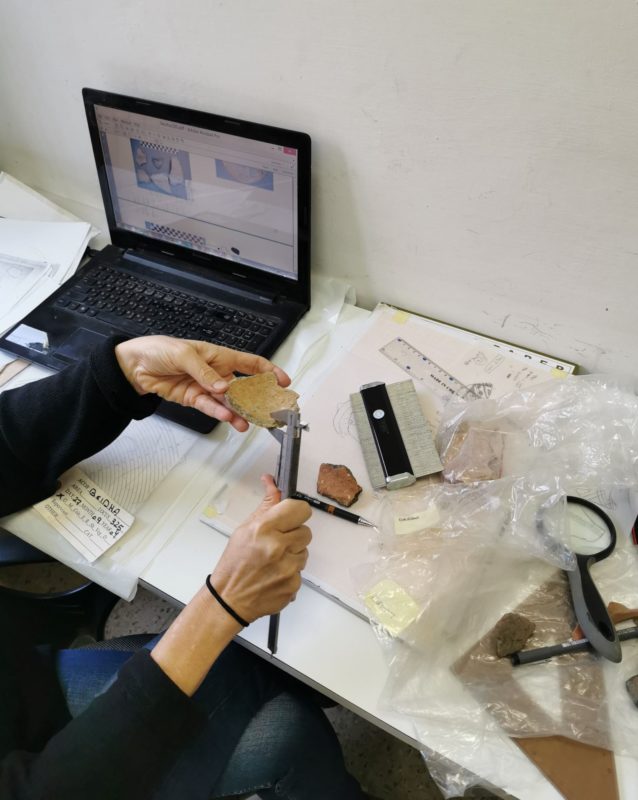This written interview is part of a new series we are launching on Insights: “Ask A Scholar,” through which we hope to highlight the personal experiences of fellows and other affiliated researchers. The below conversation, with former Bikai and de Vries fellow and Islamic Baydha director Micaela Sinibaldi, Ph.D., took place by email in November, 2020.
For many of our readers, the last time they heard updates on your work was likely your public lecture for us in 2019. How has your research and writing evolved since then?
In 2019 and early 2020, I focused on a study season and, until the COVID-19 situation slowed things down, on the first in-person presentations of the results from the six fieldwork seasons of the Islamic Baydha Project. A lecture cohosted by ACOR and the Council for British Research in the Levant (CBRL) in April 2019 was followed by a fieldwork season in October 2019 and by presentations on updated results in London at the British Museum and the Islamic Archaeology Day workshop, in Bern at the European Association of Archaeologists conference, and in Petra at Hussein Bin Talal University. Interviews were also released for articles in Archaeology magazine (“Letter from Jordan: Beyond Petra”) and the Jordan Times (“Petra Region Still Holds Completely Untapped Potential—Archaeologist”). Finally, I created and launched the Islamic Baydha Project’s new website, which collects videos, links, news, and images from the project’s six seasons. Fieldwork season 2019 produced very interesting results, as excavations at one of the mosques revealed several structures of the village’s earlier phases, one of which dates to the Byzantine period. The University of Oxford’s Endangered Archaeology in the Middle East and North Africa (EAMENA) project has also been taking, for a second year, great aerial photographs of our site.

In terms of research on the crusader period in Jordan, I was privileged to be invited to present my PhD research results at the Institute for Historical Research in London for the Crusades and the Latin East Seminar and to discuss it with scholars at the institute, which has helped greatly in the preparation of my publications on the subject. My study of the crusader-period building phases of Karak Castle in Jordan, which I based on an analysis of both the documentary sources and the castle’s built structures, was published in late 2019 in Bridge of Civilizations, the proceedings of a conference held in Esztergom, Hungary, in May 2018.
The outbreak of COVID-19 has undoubtedly affected the archaeological research community, making it nearly impossible to do international field research. How else have you adapted your work this year, given pandemic conditions?
Because the Islamic Baydha Project did not go into the field in 2020, I had the opportunity to focus on data analysis. This summer, the project has proudly received an award from the Barakat Trust, our main funder, for a study season to carry on our publication work. In addition, this quiet time, during which conferences, too, were almost completely cancelled, gave me the opportunity to focus on other publication projects. Besides contributing to Petra: The North Ridge (ACOR, 2020) and to the manual of archaeological pottery from Jordan being organized by ACOR and SCHEP, I have been preparing my contribution for the forthcoming publication of the ACOR’s Beidha Documentation Project, which was directed by Dr. Patricia Bikai from 2003 to 2008. In addition, I have been working on a further publication from my PhD research on the crusader lordship of Transjordan. For all of these projects, access to the ACOR building in Amman has been essential. Over these past months ACOR has become a much quieter place than usual, but, thanks to the staff, it was also a safe, welcoming, and productive place to carry on with work. The limited opening hours of the library have been extremely beneficial for keeping me on task. Finally, I have been able to give the finishing touches to the new documentary on the Islamic Baydha Project, which will be released soon.
Micaela at ACOR working on the pottery from Baydha. (Photos by Jessica Holland.)
As we researchers know, the silver lining of the COVID-19 situation has been many more online conferences and webinars, so I have tried to take advantage of some of these opportunities. Unfortunately, it is likely that the international conference that I am scheduled to organize for Shanghai University in 2021 will also be one of these. The logistics of the current situation are still far too complicated to plan an in-person event.
During these months based in Amman, I have been waiting for my visa and for news about travel possibilities to China, in hopes of joining my students in Shanghai for the fall semester, which started on 1 September. However, at the time I write this (November), because of travel restrictions I still have not managed to leave. I have therefore been teaching online the whole semester and have met the students and staff of the university only remotely. Although getting used to all this distance from the students took the first few weeks, from many points of view it is also extremely interesting to learn about the Chinese education system and culture. The students have already been very successful in learning and communicating through our online meetings.
Some readers may have had plans to come to Jordan this year for research or travel but can no longer do so. Do you have any advice on ways they can engage with Jordan’s history and culture from afar?
Especially during the spring, the Jordanian government dealt with the pandemic in a firm and strict way. This kept the virus largely under control, but it also has meant far fewer opportunities to go out to socialize and practice speaking Arabic. To try to make up for missing time in the external world, besides catching up more than usual with family and friends online and watching classic movies, I have been working on my Arabic language skills by watching episodes of Female (في ميل), a Jordanian TV comedy series set in Amman. I recommend it highly to friends who miss Jordan, as it is very good for not only practicing Jordanian ‘Ammiya (dialect) but also learning about contemporary culture.

Micaela Sinibaldi is a visiting professor at the Shanghai International Studies University, Institute for the Global History of Civilizations and an Honorary Research Fellow at the School of History, Archaeology, and Religion, Cardiff University. She has been awarded a number of ACOR fellowships over the years, most recently a Bikai Fellowship in 2013. A specialist in the archaeology of the Islamic and crusader periods in the Levant, she serves as the director of the Islamic Baydha Project, which is part of the broader Late Petra Project and reconstructs the history of the Islamic period in the ancient city.


Left: screenshot of the new project website. Right: Micaela Sinibaldi at ACOR working on the flotation of archaeobotanical materials from Baydha. (Photo by Jack Green.)
ACOR provides critical services to researchers around the world. As a non-profit organization, we can only do this thanks to your support. Click here to learn more about making a donation.

